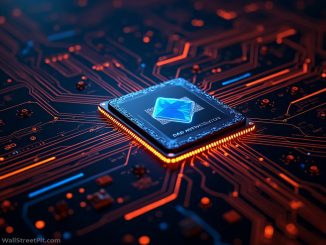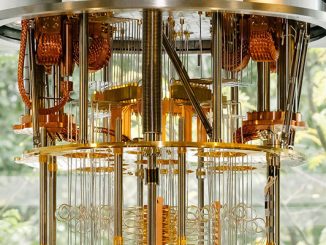- Google’s Julian Kelly says that quantum computers, like Google’s 105-qubit machine, could handle practical tasks within five years, boosted by a December error correction breakthrough, though 1 million qubits are needed for major applications.
- Microsoft’s February Majorana chip launch and Nvidia’s Quantum Day event with 12 firms, including Amazon, reflect growing quantum interest, despite Nvidia CEO Jensen Huang retracting his January doubt of a 15-20 year timeline.
- Kelly sees quantum tech, rooted in probability-based qubits, potentially generating new AI training data, though speculative, while Nvidia’s event ties the field’s hype to the AI chip boom, even as Huang calls it “insanely complicated.”

Quantum computing is inching closer to reality, with Google’s Quantum AI hardware director, Julian Kelly, telling CNBC’s Deirdre Bosa in an interview aired Tuesday that practical applications – tasks too complex for today’s computers – could be just five years away. Google (GOOG), commanding a $2.06 trillion market cap as of recent metrics, has been pushing the boundaries of this technology, which uses qubits instead of traditional bits; unlike the 0s and 1s of regular computers, qubits operate on probabilities, tapping into the strange rules of quantum mechanics. Kelly pointed out that Google’s most advanced quantum machine currently operates with 105 qubits—far below the 1 million or more qubits experts believe are necessary for real-world breakthroughs. However, a breakthrough in error correction achieved by Google in December has sparked optimism, indicating a promising path forward.
The potential is massive, with Kelly suggesting these machines could revolutionize physics by simulating scenarios beyond classical computers’ reach, or even create new data to train artificial intelligence, though he noted this idea remains speculative and current AI models won’t run on quantum systems. Meanwhile, Microsoft joined the race, unveiling its Majorana chip in February, a quantum leap requiring a brand-new state of matter, as CEO Satya Nadella described to CNBC, showcasing the field’s cutting-edge demands. Nvidia (NVDA), a leader in AI chips, doesn’t build quantum processors but hosted a Quantum Day event last week with 12 top firms, including Amazon (AMZN) and Microsoft (MSFT), signaling growing industry buzz—though CEO Jensen Huang, after doubting in January that useful quantum computers would arrive within 15 to 20 years, softened his stance last week, admitting his skepticism was off but still calling the tech “insanely complicated.”
This quantum push, spotlighted by CNBC, comes as investors, riding the AI chip wave led by Nvidia, eye quantum computing as the next big thing. Kelly’s vision of a five-year horizon, backed by Google’s progress, contrasts with Huang’s cautious long-term view, yet both underscore a field poised for impact – whether simulating physics or generating novel data – despite its daunting complexity and the qubit gap ahead.
WallStreetPit does not provide investment advice. All rights reserved.
- Bulenox: Get 45% to 91% OFF ... Use Discount Code: UNO
- Risk Our Money Not Yours | Get 50% to 90% OFF ... Use Discount Code: MMBVBKSM
Disclaimer: This page contains affiliate links. If you choose to make a purchase after clicking a link, we may receive a commission at no additional cost to you. Thank you for your support!




Leave a Reply